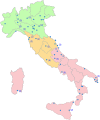The Impact of COVID-19 Quarantine on Patients With Dementia and Family Caregivers: A Nation-Wide Survey
- PMID: 33536898
- PMCID: PMC7849158
- DOI: 10.3389/fnagi.2020.625781
The Impact of COVID-19 Quarantine on Patients With Dementia and Family Caregivers: A Nation-Wide Survey
Abstract
Introduction: Previous studies showed that quarantine for pandemic diseases is associated with several psychological and medical effects. The consequences of quarantine for COVID-19 pandemic in patients with dementia are unknown. We investigated the clinical changes in patients with Alzheimer's disease and other dementias, and evaluated caregivers' distress during COVID-19 quarantine.
Methods: The study involved 87 Italian Dementia Centers. Patients with Alzheimer's Disease (AD), Dementia with Lewy Bodies (DLB), Frontotemporal Dementia (FTD), and Vascular Dementia (VD) were eligible for the study. Family caregivers of patients with dementia were interviewed by phone in April 2020, 45 days after quarantine declaration. Main outcomes were patients' changes in cognitive, behavioral, and motor symptoms. Secondary outcomes were effects on caregivers' psychological features.
Results: 4913 patients (2934 females, 1979 males) fulfilled the inclusion criteria. Caregivers reported a worsening in cognitive functions in 55.1% of patients, mainly in subjects with DLB and AD. Aggravation of behavioral symptoms was observed in 51.9% of patients. In logistic regression analysis, previous physical independence was associated with both cognitive and behavioral worsening (odds ratio 1.85 [95% CI 1.42-2.39], 1.84 [95% CI 1.43-2.38], respectively). On the contrary, pandemic awareness was a protective factor for the worsening of cognitive and behavioral symptoms (odds ratio 0.74 [95% CI 0.65-0.85]; and 0.72 [95% CI 0.63-0.82], respectively). Approximately 25.9% of patients showed the onset of new behavioral symptoms. A worsening in motor function was reported by 36.7% of patients. Finally, caregivers reported a high increase in anxiety, depression, and distress.
Conclusion: Our study shows that quarantine for COVID-19 is associated with an acute worsening of clinical symptoms in patients with dementia as well as increase of caregivers' burden. Our findings emphasize the importance to implement new strategies to mitigate the effects of quarantine in patients with dementia.
Keywords: Alzheimer’s disease; BPSD; COVID-19; caregiver burden; dementia; quarantine.
Copyright © 2021 Rainero, Bruni, Marra, Cagnin, Bonanni, Cupidi, Laganà, Rubino, Vacca, Di Lorenzo, Provero, Isella, Vanacore, Agosta, Appollonio, Caffarra, Bussè, Sambati, Quaranta, Guglielmi, Logroscino, Filippi, Tedeschi, Ferrarese and the SINdem COVID-19 Study Group.
Conflict of interest statement
The authors declare that the research was conducted in the absence of any commercial or financial relationships that could be construed as a potential conflict of interest.
Figures



References
LinkOut - more resources
Full Text Sources
Other Literature Sources
Miscellaneous

